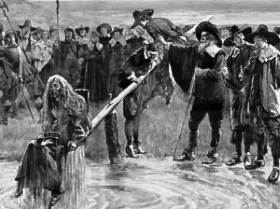Original Meaning: Cruel and Unusual Punishments
by P.A. Madison on March 19th, 2012
Summary: The prohibition against cruel and unusual punishments is a check against extralegal tribunals or discretionary acts of judges in imposing illegal and cruel punishments that are unknown to established law as practiced under the infamous court of Star Chamber.
 I thought it was about time to address the well-established ancient understanding of the Eighth Amendments provision for “cruel and unusual punishments” since it is obvious current jurisprudence has no fundamental clue to its constitutional purpose. Most judges today probably will be surprised to learn it is directed at them as security against imposing discretionary punishments not sanctioned by fixed law than anything to do with established law itself.
I thought it was about time to address the well-established ancient understanding of the Eighth Amendments provision for “cruel and unusual punishments” since it is obvious current jurisprudence has no fundamental clue to its constitutional purpose. Most judges today probably will be surprised to learn it is directed at them as security against imposing discretionary punishments not sanctioned by fixed law than anything to do with established law itself.
Cruel and unusual punishment under the Eighth Amendment is rather easy to understand because of the fact it was copied verbatim from the English Bill of Rights of 1689. The English Bill of Rights tells us the evil remedied by the words “cruel and unusual punishments” was to prohibit the practice of “illegal and cruel punishments,” because such punishments were “utterly and directly contrary to the known laws and statutes and freedom of this realm.”
The English Bill of Rights of course was in response to the evil perpetrated by the great tyrannical commission of the extralegal court of Star Chamber. The court of Star Chamber originally served as a king’s council to supervise lords under Henry VII that grew into an oppressive tool of the crown to destroy political opposition, generate revenue for the treasury through extraordinary fines and confiscation, and to punish disobedience to its illegal proclamations.
The court became so powerful it could control the press by prohibiting what could be published or punish juror’s for verdicts that displeased the King. Even Parliament grew terrified of the court.
Because punishments and fines of the court of Star Chamber were at the discretion of judges who arbitrarily pronounced guilt outside of the law of the land, often were harsh and unknown to the common law for the reason they were issued not with rule of law in mind, but cruelty and vindication. Thus, the English Bill of Rights made it illegal for any judge of a court to proscribe any punishment or fine unknown to the common law.
Like the English Bill of Rights, the Eighth Amendment secures against the executive or legislature from creating any extralegal bodies with authority to act outside of established law to impose unlawful punishments or fines. It also serves to protect against discretionary acts of judges.
The use of the old ducking-stool (not to be confused with cucking-stool) for woman was considered cruel and obsolete by the court in James v. Commonwealth, 12 Serg. & R. 236, yet agreed the law would been upheld if was a lawfully prescribed punishment under Pennsylvania codes rather than a discretionary imposed punishment of a judge.
In closing, history strongly reveals the Eighth Amendment has nothing to do with treatment, pain or suffering but rather the imposition of cruel treatments outside of established tribunals of law.
I have just finished reading Charles Spencer’s interesting book about the 1649 execution of King Charles I, the short and chaotic history of the British Republic, and the measures for retribution imposed by Charles II on the men who were most involved with that execution, after the Restoration of the monarchy in 1660. Twelve of those who participated in the trial and execution of Charles I were executed by being “hanged, drawn and quartered,” a particularly savage form of execution reserved for traitors (and the corpses of others who died before the Restoration were dug up and hanged.) There were also a number of botched beheadings later in the 17th century. There was also the history of Execution Rock, where Long Island Sound meets the East River. Convicted pirates were chained to the rock at low water, and left to be drowned by the incoming tide.
I believe that the history of those brutal executions likely influenced the Constitutional Convention to adopt this clause.
I think it was Wilson who described any punishment not prescribed by law of the land to be cruel or illegal. I have no doubt that is the principle conveyed by the words.
Edmund Randolph said cruel and unusual punishments can only be inflicted once laws are made and judges ignore those laws of justice.